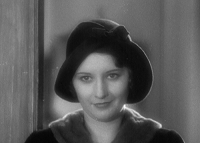 |
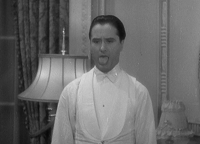 |
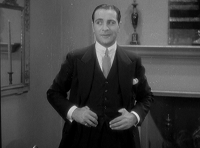 |
| Ann Vincent Barbara Stanwyck |
Dick Ives James Rennie |
Price Baines Ricardo Cortez |
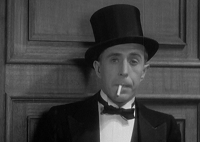 |
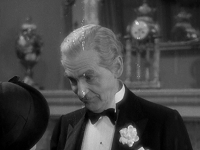 |
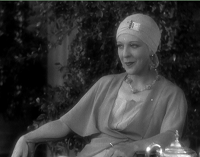 |
| Georgie Evans Clive Butterworth |
Ives, Sr Claude Gillingwater |
Margie True Natalie Moorhead |
Illicit: Can Sex Survive Marriage?
“We’re both a riot in our underwear!”
There are probably few movies that can serve as such definitive proof in how much social mores have changed in the last 80 years than Illicit. To call it dated is polite, as it inhabits a world foreign to our own; luckily the film has enough spice coming from its cast to prevent it from being a complete bore.
“Can romance survive marriage?” asks Illicit‘s tagline. I’m going with a no, at least on the basis of what transpires here. Ann (Stanwyck) is a young woman who’s happier spending intimate time with her man without the burdens of a ceremony and title to unite them. Dick (Rennie) is a bit more concerned, and frets what society will think if they find out that they know each other’s morning routines so well.
Ann really gives the free wheeling lifestyle a go until Dick’s respectable father (Gillingwater) tells them that marriage isn’t that bad, and pressures Dick into making an ultimatum. Deciding she’d rather be comfortable than free, Ann concedes to getting married.
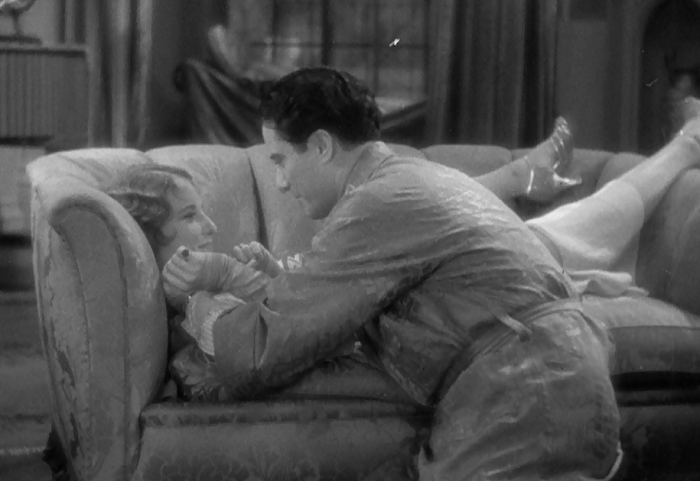
Scandalous canoodling!
Stanwyck is only in her early 20’s here in one of her first starring roles, but it’s hard not to notice how talented she is from the get go. Ann radiates both vulnerability and independence is equal doses, and its hard to believe who else could sell a role filled with such then-scandalous accusations without a hint of perversion. Watching her blithely list her previous lovers and warmly assert that marriage is just a chain around your neck could come across as petulant or whiny, but Stanwyck imbues them with the right amount of humor and grace.
It’s a good thing, too, as the gears begin turning for the couple. Ann has an old flame, Price (Cortez), who notes with a dash of nastiness, “Ann has decided to become just another piece of property.” Meanwhile, Dick’s ex, Margie, keeps coming around, finding him enticing now that he’s no longer available.
The couple also has a pair of friends who figure into the proceedings. George (Butterworth) is a drunk and a former fling of Ann’s. Duckie (Joan Blondell in an early role) is the confidant, who keeps Ann’s head level with her wisecracks. For the record, the movie never explains why her nickname is Duckie.
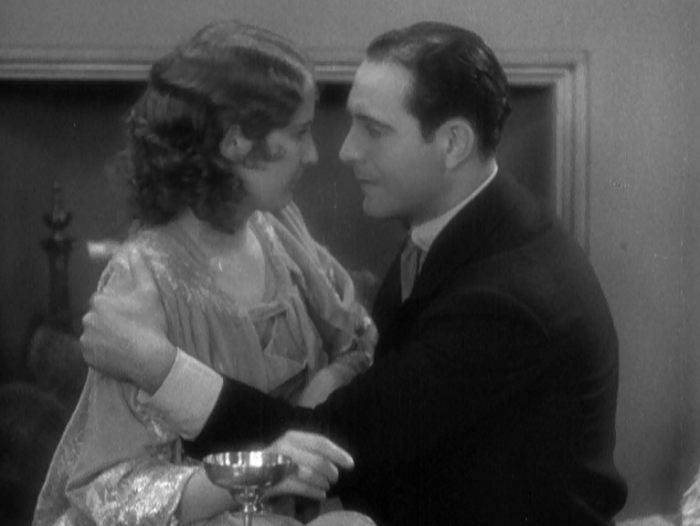
“Look, I’m Ricardo Cortez! What more could a woman want from a man?!”
The marriage goes south pretty quickly, as Dick feigns a headache whenever Margie isn’t around, and all of Ann’s latent suspicions are confirmed: once she made him a one woman man, he wants another woman.
Several attempts to fix this are tried, from her moving out to the possibility of a divorce being floated about. The two try their best through this, but both find themselves succumbing to jealousy and accusations in any situation. Finally the possibility arises that Dick and Margie may run away to South America together. Ann and Dick must decide that if what they want is a love affair, a marriage, or none of the above.
Illicit says it’s about romance, but it’s really about sex. Like many other pictures, it’s concerned with how much a man wants and whether that’s enough for marriage to provide. Refreshingly, it doesn’t lay the blame solely on the female half of the equation. Where something like Madam Satan maintains that marriage is the woman’s business, Illicit allows Ann to mean it when she exclaims, “I can’t carry a marriage out all on my own!”
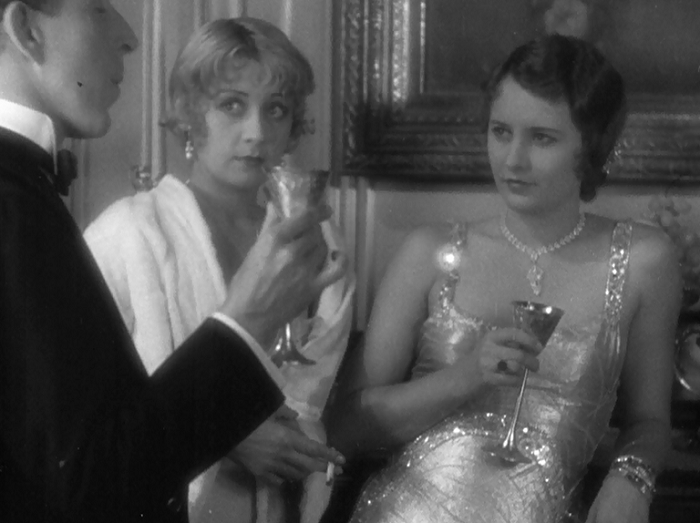
The worse part is that she can hardly get a drink in with Georgie snagging them all of the time.
But while it may not be as rooted in Victorian morals as Madam Satan pretends to be, the world that Ann and Dick’s marriage is in is still very much a cloistered one. Though they’re happy, the mere fact that they’re having sex before marriage is seen as a scandal of the highest order.
Also problematic is that the film comes from Ann’s perspective, which makes many of Dick’s actions seem wholly barbaric nowadays though treated back then as acceptable. Ann doesn’t engage in an affair but he does: she doesn’t get to balance the books (as per The Divorcee), but must instead find it within herself to understand that this shit happens and you have to get over it. Funny how few movies we see where the man is asked to understand this of the woman.
The solution to their marital troubles remains simply to keep trying and hope things work themselves out. For a film that bases itself on asking if romance can survive, it climaxes in a weak answer. If stated, it would essentially be, “Yeah, I guess?”
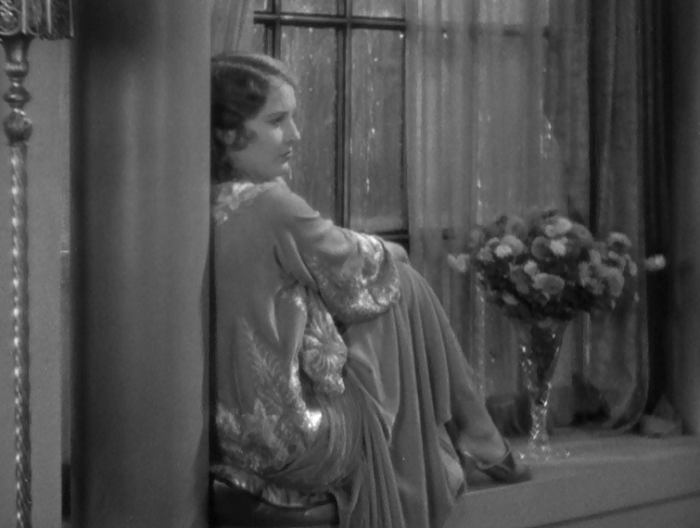
It’s like raaaaaain. On your divorce day.
The biggest drawback for Illicit, besides its non-conclusion of a conclusion, comes from Archie Mayo’s direction. Sometimes giving far too much headroom, his camera only makes a few dynamic movements in the film’s runtime. There are a few good scenes: the characters see what Margie and Dick are up to in the kitchen and we don’t. A pullback as Ann closes the doors on her marriage. Charles Butterworth left to be Charles Butterworth.
But otherwise there’s often too much headroom and stagey compositions. If the material isn’t dated, then the camerawork really is.
Illicit isn’t nearly as good as Bad Girl or other similar movies from the time it was made, but despite my displeasure with some of its particulars, it’s not a lousy movie either. Stanwyck imbues her role with vivacity, and the supporting work is a lot of fun.
The story here, of about how marital duties become marital chores, hasn’t aged well, and its heavy dramatics haven’t either. For Stanwyck fans, it’s a nice glimpse into her early work, but I can’t imagine many getting much else from it.
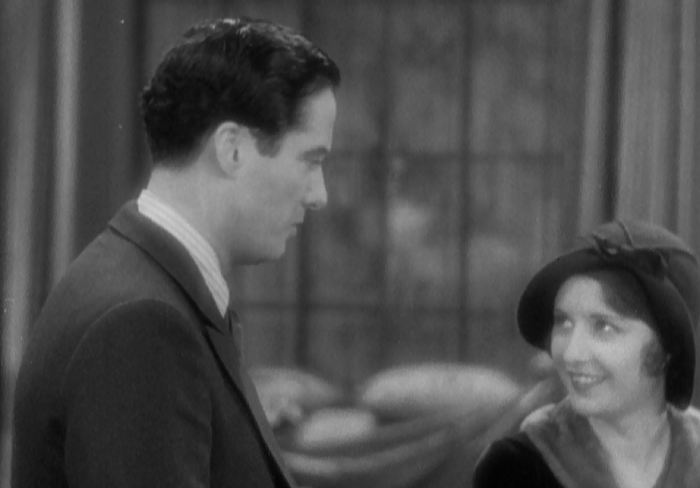
The movie summed up: Odd framing, lovely smile.
Proof That It’s Pre-Code
- It starts off being about how awesome premarital sex is. Good times.
- It’s also about how bad extramarital sex is. Not so good times.
- At one point Joan Blondell says this and it is amazing:
“Ann Vincent! Don’t tell me you’re so old fashioned that you wear– hangin’ my head– undergarments! […] Once a girl is headed to the altar, she becomes so conventional.”
Gallery
Trivia & Links
- At one point in the film, Dick and Ann discuss going to catch 50 Million Frenchmen. I’m assuming they’re talking about the popular stage musical, and not the film version that came out the same year that this was released.
- Twenty Four Frames a Second goes into the background of this picture, pointing out that Stanwyck and Blondell became friends on the set of the film. He also notes how bad Mayo’s direction is here; I agree!
- Pre-Code dog watch. Check out this lovely Dane:
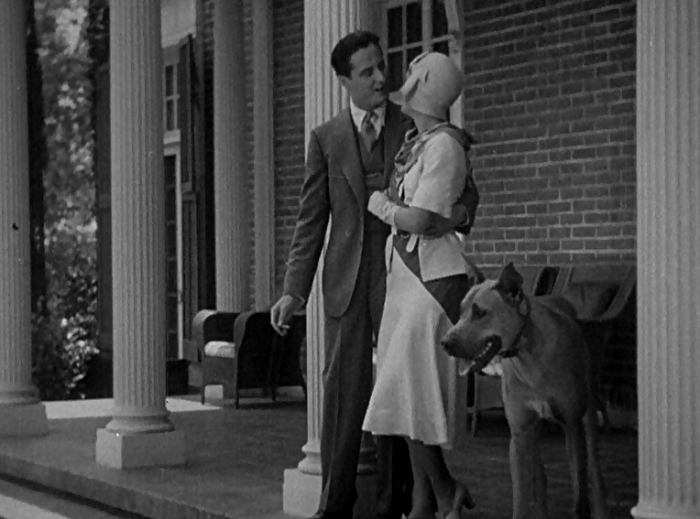
So happy!
- There’s a fansite called The Films of Natalie Moorhead (who plays Margie here). Even they seem underwhelmed by this one.
- Cliff at Immortal Ephemera mentions this in his big Barbara Stanwyck Pre-Code roundup, and he likes it at least.
- Mordaunt Hall’s contemporary review in the New York Times (the review’s titles are mixed up, so the Illicit review is actually the first listed) is generally positive, though he admits the story has been done better elsewhere. To wit:
Although the happenings in this production are not particularly dramatic or original, the tale is well worked out and whether Richard and Anne are frowning or cheerful, their doings are always interesting.
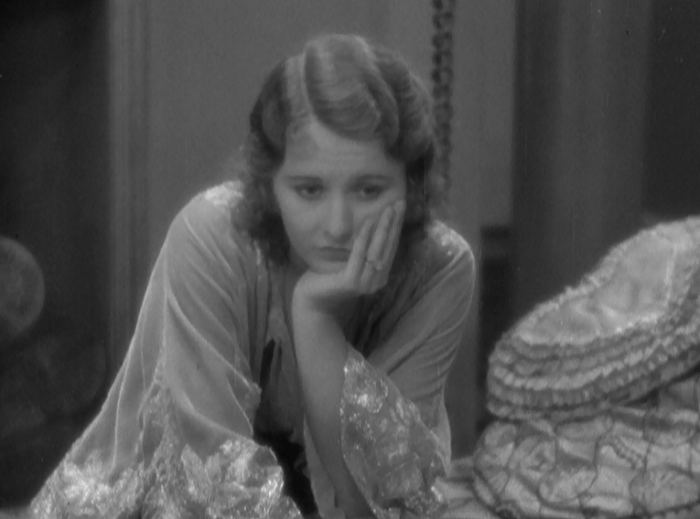
Boy howdy. What a love affair.
- Some of you may expect more from me, but for anyone of a dirty mind and a love of (probably) unintentional double entendres will find the ending argument between Margaret and Ann is hilarious:
“You know I’ve gone after Dick once or twice!”
“I’ve always been in love with Dick!”
“I happen to love Dick!”
“I came here for Dick’s sake!”
Availability
- This film is available on Amazon and Warner Archive, and can be rented from Classicflix.
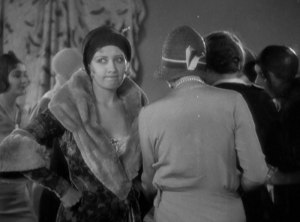 Comment below or join our email subscription list on the sidebar!
Comment below or join our email subscription list on the sidebar!
Home | All of Our Reviews | What is Pre-Code?
About the Site | Follow @PreCodeDotCom

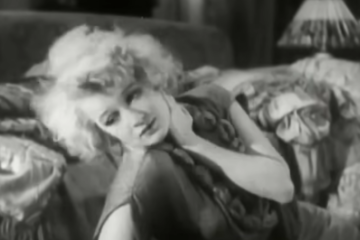
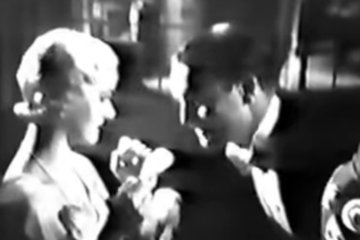
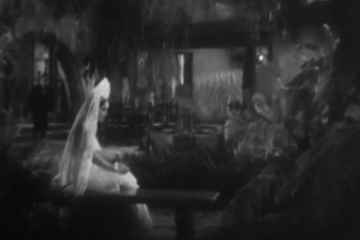
7 Comments
Lisa Alkana · April 27, 2013 at 2:39 pm
I love pre-code, I love Stanwyck, and I love Illicit. Yes, the ending is less than satisfying, but it illustrates something most people today can’t really comprehend. The 1st generation of 20th century men just couldn’t handle the 20th century woman. Not that it improved all that much over the years, but it was the Hollywood women of the 1930s who proved that a woman’s work could venture beyond the home, classroom, library or steno pool.
Thank you Barbara, Ginger, Irene, Carole, Joan, Bette, Myrna, and the rest. I never cleared the bar you set, but you were my inspirations.
Danny · April 27, 2013 at 2:48 pm
I adore the way you put that, and completely agree. Thanks for sharing!
Waldo Gemio · January 31, 2014 at 11:54 pm
I’ve been a Stanwyck fan since seeing Ball of Fire as a teenager several decades ago. I’m reading the vast new biography, and I’ve made it my mission to see all of her 88 feauture-length movies – this was 70th, and it’s by far the worst yet.I almost gave up on this, it’s so tedious, so static. She’s young, she’s beautiful, but even Stanwyck is less interesting in this than the supporting players, especially Butterworth and Blondell. Thank goodness for the unintentional ‘Dick’ jokes.
Danny · February 2, 2014 at 11:42 am
Ha! Yeah, Illicit has a few redeeming qualities, but it’s so dated it’s hard to take very seriously. I wish you well on your quest– I’ve thought of doing the same many times before– and especially if you have the incomprehensible Shopworn or the very dull Ten Cents a Dance left to go.
Waldo Gemio · February 2, 2014 at 10:30 pm
Yes, but I saw Shopworn on the big screen at the National Film Theatre and rated it a C compared to Illicit’s E; even Ten Cents a Dance (another C from me) is of interest, though apparently Lionel Barrymore kept falling asleep in the director’s chair, overdosing on morphine for his chronic pain, and Ricardo Cortez gave her nothing to work with – for me, the other early talkie-turkey, so to speak, is Mexicali Rose (E). But, from the 30s, we’ll always have Night Nurse, The Bitter Tea of General Yen, Babyface, and The Mad Miss Manton (which I will watch yet again), among many other worthwhile films.
Danny · February 3, 2014 at 10:19 pm
Okay, that story of Ten Cents doesn’t surprise me one lick. I will admit I liked Mexicali the one time I saw it four or five years ago, but I wouldn’t be surprised to see that it doesn’t hold up. And you’re right: Stanwyck has a great run in the 30s. But I think she still had some rotten luck at the start when people just didn’t know what to do with her.
Comments are closed.